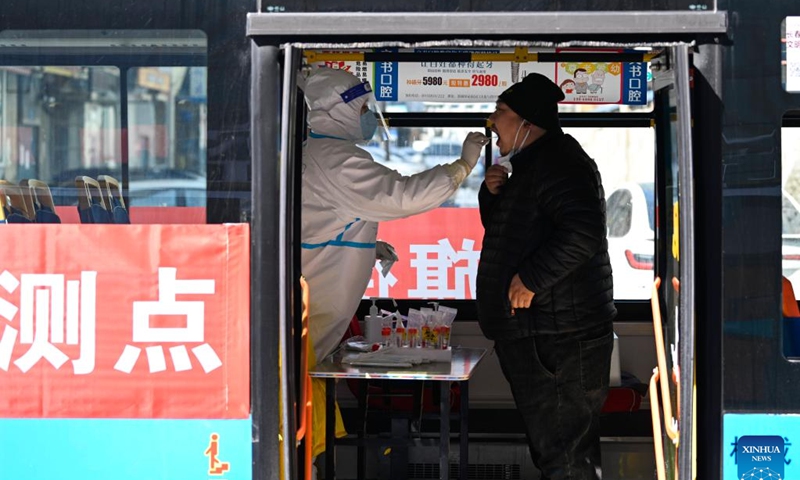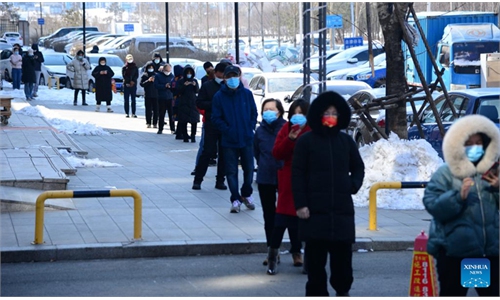Total number of COVID-19 positive cases in NE China's Jilin likely to reach 120,000 by late May: expert

A citizen receives nucleic acid test on a bus used as a temporary testing site in Changchun, northeast China's Jilin Province, March 20, 2022. Photo:Xinhua
The COVID-19 epidemic situation in Northeast China's Jilin Province, which has reported more than 60,000 positive cases in the fresh wave, is still worsening despite some positive signs of decline in parts of its capital Changchun and nearby city Jilin.
An estimate by a Peking University professor, who has closely followed the national epidemic situation, showed that the total number of daily positive cases in the province is likely to reach 120,000 by late May.
The growing epidemic is feared to affect the coming spring planting season in the major corn-growing hub, experts said.
Since March 1, the province has reported more than 60,000 COVID-19 positive cases, with Changchun's epidemic situation still in development and Jilin city's new infections showing a declining trend with fluctuations, the National Health Commission said on Wednesday.
At Wednesday's media briefing, Zhang Baozong, an official with the Jilin provincial government, said Changchun's battle for no community infections has made some new progress.
Local districts in Changchun have carried out major tasks and optimized community management teams. The city of Meihekou set up 700 teams to conduct nucleic acid testing door-to-door, Zhang said.
Nearly 20,000 college students and faculty members from 22 colleges that reported COVID-19 cases in the province had returned to their campuses as of Wednesday, the local government said.
Changchun on Sunday vowed to achieve no community infections in the main areas of the city in five days, and find all positive cases in communities through three rounds of targeted nucleic acid testing, the Changchun Daily reported.
As for whether it's likely for the city to achieve no community infections in five days, Wang Guangfa, a Beijing-based respiratory expert, told the Global Times on Wednesday that it would be possible if Changchun reported single-digit community infections for days, but he warned that incomplete and improper testing could also result in "no infections" in communities.
Wang said that it's important to analyze the sources of the community infections to find if there were any sources we missed or any loopholes we failed to find.
Based on the development of the epidemic in the province, Yao Maosheng, a professor at the College of Environmental Sciences and Engineering at Peking University, estimated on Wednesday that Jilin Province's COVID-19 outbreak is expected to hit a daily increase peak in a day or two.
According to his estimate, the total number of daily cases in the province, including confirmed and asymptomatic ones, may drop to below 100 in early June. The total number of positive cases is likely to reach 120,000 by late May.
Unlike Shanghai, the proportion of asymptomatic cases in Jilin Province is smaller, and it displayed a "U" shape change over the past month, Yao said, noting that the differences among cities are likely due to variations in air toxicity, viral mutations and vaccination rates. Yao cautioned that the estimate is influenced by many factors and varies even within a single day.
As the epidemic is likely to stretch into June, local seed companies fear that spring planting in the province, the country's corn production hub, may be delayed.
Zhao Lewei, a representative with the Changchun Jinyuan Seeds Co, told the Global Times that the company sells seeds to local farmers as well as seed agents, and the epidemic has affected the purchase and transportation of seeds and fertilizers.
Zhang Hongliang, another company representative, told the Global Times he was worried that in some places hit hard by COVID-19, spring planting may be delayed by 10 to 20 days. He said that 70 percent of the fertilizers on hand haven't been sold due to logistics difficulties and soaring prices.
Zhao said the government has set up a "green channel" to speed up distributing seeds after disinfection.
Addressing the challenges in spring planting, Changchun published an emergency notice saying it had set up a "green channel" for farmers stuck in the city to apply for returning for spring planting.
According to the notice, farmers who were stuck in Changchun due to epidemic could apply to return with negative nucleic acid and antigen test results. Local counties will arrange their transportation home.


